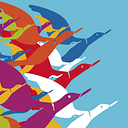The story of Hurdal Ecovillage
by Simen Torp — an excerpt from Ecovillages Around the World

After more than ten years of planning, the first new Norwegian Ecovillage gains momentum; linking up with the business world, politicians and other mainstream players, it is the hub of a growing Sustainable Valley.
Establishing Norway´s first new ecovillage has been a long, demanding and exciting journey. Our idea was to buy a farm and turn it into an ecovillage. In 1998 we were more than 100 people in ‘Kilden’ (‘the source’) ecovillage group, trying to find the ‘right’ place. We visited more than 40 potential sites in three years. Finally, the mayor of Hurdal municipality contacted us; they owned a parish farm, called Gjøding gård. I had a strong sense that this was the place. The farm had 16 ha of fertile farmland, a lot of forest, a beautiful beach by the lake and a river nearby. Hurdal municipality is 30 minutes north of the Oslo airport Gardermoen, with 2,700 inhabitants (in 2016).
However, most of Kilden’s members wanted to live closer to the city of Oslo. Only my wife Kristin and I, and another young couple decided to focus on Hurdal. In 2002 we were there: two young families with a vision of an ecovillage. I was 24 years old, with no formal education, no money, no experience in building or creating a community. But I had two important things — a clear ‘inner voice’ and a limitless, powerful vision that was slowly turning into a life mission. […]
We have now started an ecovillage company called Filago, that is a driving force for making sustainable homes and an eco-friendly lifestyle available for everyone. Filago is founded on the triple bottom line of sustainability: the three P’s: People, Planet and Prosperity.
In the autumn of 2013, neighbours, visitors and the media came to see the construction site. Finally, something ‘big’ was happening in little Hurdal. Even conservative locals started to become proud. Other municipalities contacted the Hurdal council saying: ”You guys are lucky to have this fantastic ecovillage project”. In November 2016 more than 160 people were living in Hurdal Ecovillage and 70 houses had been sold. We plan to be fully developed by 2020 when the ecovillage will consist of 200 apartments/houses with about 500 people.
Since starting our project we have aimed to build bridges to authorities, politicians, neighbours, entrepreneurs, banks, media and the rest of mainstream society. I don’t believe in creating isolated islands — but rather an attractive ‘lighthouse’ that demonstrates sustainable practices and consciousness, and attracts positive attention from all levels of society. The time has come to demonstrate ‘luxurious simplicity’. People will understand that everything we do in ecovillages is based on common sense. You can experience, touch and understand sustainable solutions. Most people want good food without pesticides, to live in a healthy house, not to destroy our planet, more peace and love in their lives, less stress and a healthier life, and being able to spend more time with their family and neighbours.
To me, the ecovillage concept is all about creating win-win-win-win solutions. One of the key factors is to build bridges into the financial world. Many wealthy people are ready to invest in what we are doing. Deep within, we are all ‘farmers’ who want to sow our seeds in fertile soil, take care of the small plants that come up and share and enjoy the harvest together with people we love and care about.
This is an excerpt from Ecovillages Around the World — 20 Regenerative Designs for Sustainable Communities. This beautiful book shows how we can live lightly on the planet no matter where on earth we live. It provides examples, solutions and inspiration for a sustainable future. You can buy it here.
Read more about Hurdal Ecovillage here.
— — —
Gaia Education is a leading-edge provider of sustainability education that promotes thriving communities within planetary boundaries.
